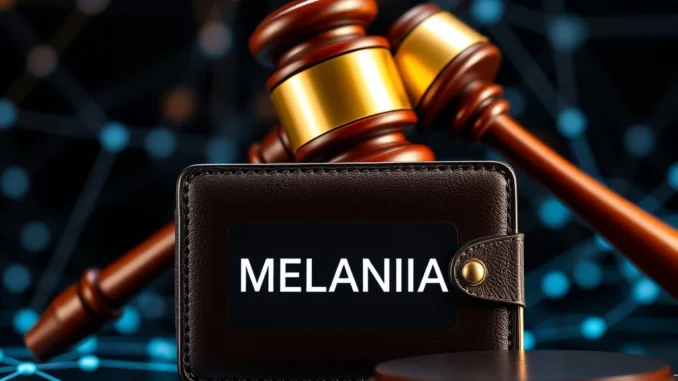
Buckle up, crypto enthusiasts! The drama is unfolding in real-time as a crypto wallet, dubbed ‘MELANIA’ and suspected to be connected to a Trump insider, is facing explosive allegations. Did this wallet engage in crypto trading with stolen funds? Let’s dive into the unfolding saga that has the crypto community buzzing.
Trump Crypto Wallet Under Fire: What’s the Accusation?
The crypto sphere is no stranger to controversy, but when accusations involve wallets potentially linked to high-profile figures, things get particularly spicy. In this case, the blockchain address ‘MELANIA’ found itself in the crosshairs of prominent crypto investigator ZachXBT. ZachXBT, known for his meticulous on-chain analysis and uncovering crypto shenanigans, publicly claimed that the ‘MELANIA’ wallet engaged in crypto trading using – wait for it – stolen funds. Yes, you read that right. Stolen funds. This is not your average Tuesday in crypto town.
The accusation was dropped on X (formerly Twitter), the go-to platform for crypto discourse and drama. According to ZachXBT, this wallet, often referred to as a ‘Hyperliquid whale’ due to its significant holdings and trading activity on the Hyperliquid decentralized exchange, wasn’t just playing the crypto game; it was allegedly playing with pilfered digital assets, specifically for online gambling. The crypto community held its breath. Was this another case of blockchain bad behavior coming to light?
Stolen Crypto Funds: Denial and Counter-Claims from ‘MELANIA’ Wallet
In the world of blockchain, silence isn’t golden; it’s deafening. And the ‘MELANIA’ wallet owner understood this perfectly. Responding swiftly to the allegations, the wallet owner took to X to vehemently deny ZachXBT’s claims. In a public statement, they dismissed the accusations as utterly ‘baseless’. Imagine the digital equivalent of a mic drop. But the denial didn’t stop there.
The ‘MELANIA’ wallet owner offered an alternative narrative, a classic defense in the crypto world: they claimed their address frequently receives ‘unsolicited transactions from scammers.’ This is a common occurrence in the crypto space, where bad actors often send small amounts of cryptocurrency to numerous addresses in phishing attempts or other scams. The wallet owner essentially argued that any suspicious transactions were not of their doing but rather the result of being a target for these nefarious activities. It’s a case of mistaken identity, or perhaps, a clever deflection?
Let’s break down the core claims and counter-claims:
- ZachXBT’s Claim: The ‘MELANIA’ wallet used stolen crypto funds for trading and online gambling.
- ‘MELANIA’ Wallet’s Denial: Accusations are baseless; any unusual activity is due to unsolicited transactions from scammers.
This sets the stage for a classic ‘he said, she said’ scenario, but in the high-stakes world of cryptocurrency, where transparency and traceability are supposed to be hallmarks.
ZachXBT Investigation: Evidence Incoming – Will It Be Game Over?
In the face of the ‘MELANIA’ wallet’s denial, ZachXBT doubled down. He didn’t just shrug and walk away. Instead, he announced he would release evidence to back up his claims. Talk about raising the stakes! The crypto community collectively leaned forward, popcorn in hand (virtually, of course). The promised time? 13:00 UTC. Mark your calendars, folks.
ZachXBT’s assertion was clear and unwavering: his claims were ‘based on facts, not speculation.’ This is a crucial point. In the age of misinformation and rampant speculation, especially in the crypto world, relying on verifiable on-chain data is paramount. ZachXBT’s reputation rests on his ability to sift through blockchain transactions and uncover illicit activities. His promise of evidence suggests he believes he has concrete proof to support his allegations. Is this the beginning of the end for the ‘MELANIA’ wallet’s defense? We’re about to find out.
What kind of evidence could ZachXBT be preparing to drop? Here are a few possibilities:
- Transaction Tracing: Detailed analysis showing the flow of funds from known stolen wallets to the ‘MELANIA’ wallet and then to gambling platforms or exchanges.
- Wallet Clustering Analysis: Linking the ‘MELANIA’ wallet to other addresses associated with known illicit activities.
- Timestamp Correlation: Demonstrating that transactions into the ‘MELANIA’ wallet occurred shortly after known crypto heists or scams.
The crypto world waits with bated breath. Will ZachXBT’s evidence be damning? Or will the ‘MELANIA’ wallet’s denial hold water? 13:00 UTC is the hour of truth.
MELANIA Wallet: Hyperliquid Whale or Scammer Target? Unpacking the Identity
The ‘MELANIA’ wallet label adds another layer of intrigue. The name itself is, of course, reminiscent of former First Lady Melania Trump. While the connection is purely speculative at this point, the moniker has undoubtedly amplified the story’s reach and interest. The label ‘Hyperliquid whale’ further paints a picture of a significant player in the decentralized finance (DeFi) space, particularly on the Hyperliquid exchange. Whales, in crypto parlance, are individuals or entities holding large amounts of cryptocurrency, capable of influencing market movements.
However, the ‘MELANIA’ wallet owner’s defense hinges on the idea that they are *not* a whale engaging in illicit activities, but rather a victim – a target of scammers who indiscriminately send transactions to numerous addresses. This raises a valid point. Many crypto wallets, especially those that are publicly known or have been active for a while, do receive unsolicited and often suspicious transactions. It’s the digital equivalent of spam mail, but on the blockchain.
So, is the ‘MELANIA’ wallet a sophisticated crypto whale caught in a web of stolen funds, or an innocent bystander unfairly targeted by accusations and scammer dust? The answer likely lies in the evidence – or lack thereof – that ZachXBT is poised to reveal.
Crypto Gambling and Stolen Funds: A Dangerous Mix? The Wider Implications
Beyond the immediate drama surrounding the ‘MELANIA’ wallet and ZachXBT’s investigation, this situation shines a spotlight on a broader issue: the intersection of crypto gambling and illicit funds. The decentralized and often pseudonymous nature of cryptocurrency makes it attractive for both legitimate online gambling and, unfortunately, for laundering or utilizing stolen funds. If ZachXBT’s allegations prove true, it would underscore the risks and challenges in regulating and monitoring the use of crypto in online gambling platforms.
Here’s why this is a significant concern:
- Anonymity and Traceability Paradox: While blockchain transactions are transparent and traceable, the pseudonymity of wallet addresses can make it challenging to identify the real-world individuals behind them. This can be exploited to obscure the origin of illicit funds.
- Regulatory Gray Areas: The regulatory landscape for both cryptocurrency and online gambling is still evolving in many jurisdictions. This creates loopholes and opportunities for illicit activities to thrive.
- Reputational Risk for Crypto: Cases involving stolen funds and crypto gambling can tarnish the reputation of the entire cryptocurrency industry, hindering wider adoption and trust.
The outcome of this ‘MELANIA’ wallet saga could have ripple effects, potentially prompting increased scrutiny and calls for stricter regulations in the crypto gambling space. It’s a reminder that while blockchain technology offers immense potential, it also comes with inherent risks that need to be addressed proactively.
The Cliffhanger: Waiting for ZachXBT’s Evidence Drop
The crypto world is on tenterhooks, waiting for 13:00 UTC. Will ZachXBT deliver the smoking gun that confirms his allegations against the ‘MELANIA’ wallet? Or will the evidence be less conclusive, leaving room for doubt and further debate? Regardless of the outcome, this incident serves as a powerful reminder of the ongoing cat-and-mouse game between crypto investigators and those who seek to exploit the decentralized ecosystem for illicit gains. Stay tuned, because this story is far from over. The evidence, as they say, will speak for itself. And in the world of blockchain, the truth is always on-chain… somewhere.



